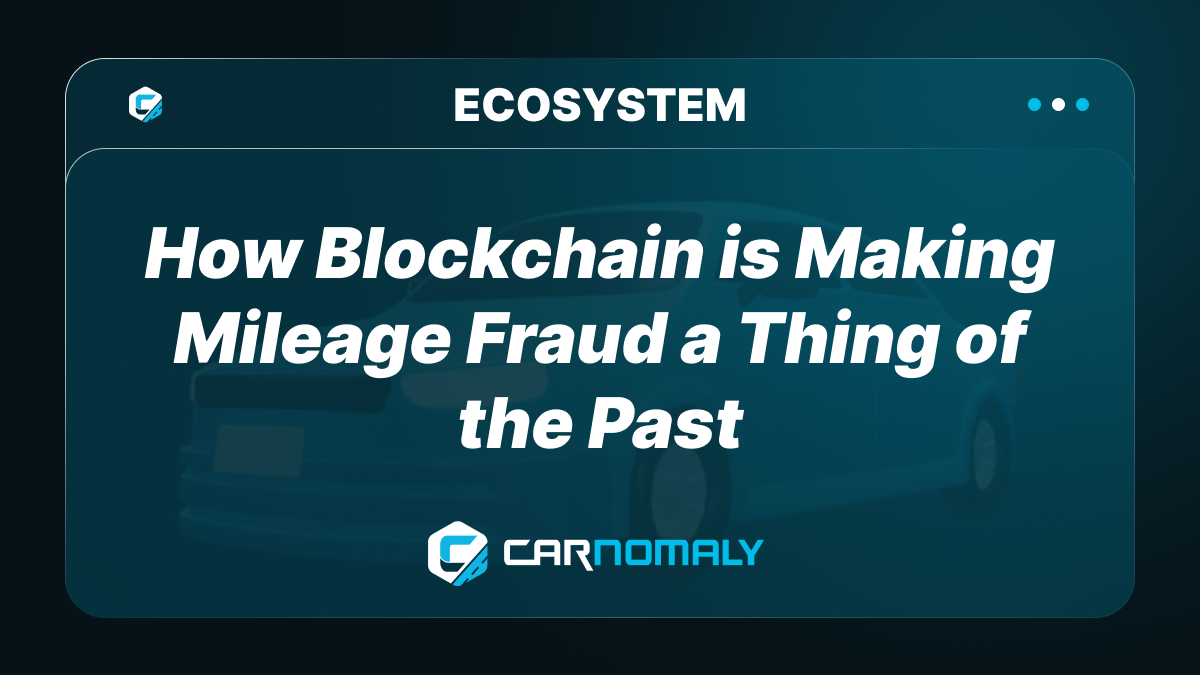At Carnomaly, we will be pioneering the use of blockchain technology to make vehicle transactions, including mileage tracking and verification. simpler and more secure.
Mileage fraud is a pervasive issue that can cost vehicle owners, dealerships, and buyers thousands of dollars each year. With the rise of blockchain technology, though, this outdated practice is becoming less feasible, bringing transparency, security, and traceability to vehicle data like never before. Let’s explore how blockchain is changing the game when it comes to tracking and verifying a vehicle’s mileage, and why it matters.
The Problem of Mileage Fraud
Mileage fraud occurs when the odometer reading on a vehicle is altered or manipulated to reflect a lower reading than what is actually recorded. This practice can inflate the perceived value of a vehicle, allowing sellers to demand higher prices than a vehicle is worth. The problem is widespread, with studies estimating that as much as 1 in 5 used vehicles have odometer fraud.
This deceptive practice can lead to financial losses for consumers, reduced trust between buyers and sellers, and a less competitive used-vehicle market overall.
How Blockchain Can Help
Blockchain technology offers a secure, immutable way to record and track data across a network of computers. Because blockchain stores data in blocks that are linked and encrypted, any change to this data would require consensus across the entire network to be approved and updated. Here’s how it applies to mileage tracking:
1. Decentralized Record Keeping: By using blockchain, mileage data can be recorded and stored in a decentralized manner. This means that the information is accessible and verifiable by multiple parties, including dealerships, owners, and service providers. Each transaction, from maintenance checks to service history, can be recorded and verified in real-time, ensuring data integrity.
2. Traceability and Transparency: With blockchain, every change in a vehicle's odometer reading can be tracked and traced back to its original data source. This eliminates the possibility of data manipulation and fraudulent odometer tampering. Consumers can verify a vehicle's mileage history by accessing a secure blockchain-based database.
3. Smart Contracts and Automated Verifications: Smart contracts on the blockchain can automate the verification of maintenance records and odometer readings, ensuring that data is accurate and up to date. This process can be seamlessly integrated into the buying and selling process, enabling dealerships and owners to verify mileage data before closing a sale.
Carnomaly’s Role in Mileage Tracking and Verification
At Carnomaly, we will be pioneering the use of blockchain technology to make vehicle transactions — including mileage tracking and verification, simpler and more secure. Our solution will leverage blockchain to record and store verified data, including mileage, ownership history, maintenance records, and more. By integrating this data into our ecosystem, dealerships and vehicle owners will be able to make informed decisions and ensure transparency throughout the transaction process.
For example, when a seller taps "Get a Quote" on the Carnomaly app, buyers will instantly gain access to verified mileage data and history reports. This ensures the vehicle's odometer reading is accurate and trustworthy. This approach will help eliminate mileage fraud and protect both the buyer and seller throughout the transaction process.
Conclusion
As technology continues to evolve, the risk of mileage fraud will become less relevant thanks to blockchain. By bringing transparency, traceability, and security to vehicle data, blockchain technology will transform how we buy, sell, and own vehicles. Carnomaly's blockchain-based solution will be at the forefront of this change, ensuring that consumers and dealerships can transact confidently and securely.
With blockchain, the practice of altering a vehicle's mileage to boost its perceived value is becoming a thing of the past. This level of transparency and security benefits everyone, from dealerships looking to establish trust with customers to consumers seeking a more reliable used-vehicle market.


